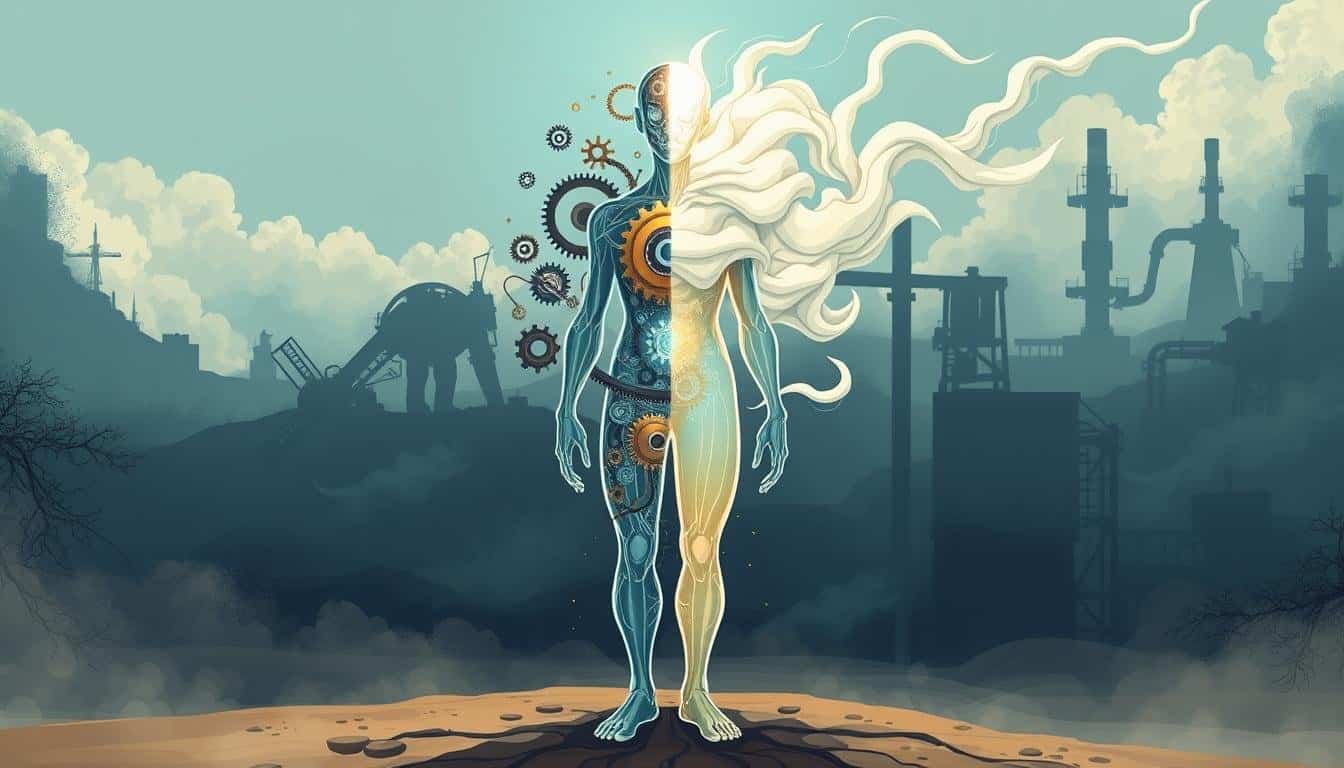Philosophy of the Mind-Body Problem: Dualism vs. Physicalism
Have you ever thought about whether your thoughts and feelings come from your body or if they’re something more? This question is at the core of the mind-body problem. It’s a deep dive into how our mental and physical states are connected. The debate between dualism and physicalism shows us two different views on what makes us who we are.
Dualists believe our minds and bodies are two separate things. On the other hand, physicalists think everything in our minds can be explained by our bodies. Let’s explore these ideas and see how they change the way we think about being conscious.
Key Takeaways
- The mind-body problem questions the relationship between mental properties and physical properties.
- Dualism posits that the mind is distinct and independent from the physical body.
- Physicalism suggests that mental states are physical processes within the brain.
- Historical philosophers like Plato and Aristotle contributed significantly to dualist concepts.
- Consciousness poses challenges for physicalist interpretations, requiring further exploration.
- Cognitive science plays a crucial role in understanding the dynamics of mind and body.
- Both perspectives offer insights but face critiques that highlight their limitations.
The Mind-Body Problem: An Overview
The mind-body problem is a key topic in philosophy. It looks at how our thoughts and feelings connect to our bodies. Philosophers have been trying to figure this out for a long time, leading to different views like dualism and physicalism.
Defining the Mind-Body Problem
This problem asks big questions about consciousness and its link to the physical world. Dualism says our mental and physical states are separate things. Physicalism believes our mental states can be fully explained by physical processes. These ideas lead to debates among philosophers.
Historical Context of the Mind-Body Problem
Over time, the mind-body problem has changed a lot. Famous thinkers like René Descartes talked about the mind and body being separate. This idea was challenged by new science that showed how our brains and feelings are connected.
Neurophilosophy has made the topic even more interesting. It looks at how our brains work to create our thoughts and feelings. Walter J. Freeman’s ideas about circular causation add to the ongoing debate.
The story of the mind-body problem shows it’s still a big topic in philosophy. Events like the Solvay Conference in 1927 brought together ideas from science and philosophy. This has led to ongoing discussions about how our minds and bodies are connected.
Understanding Dualism in Philosophy
Dualism is a deep dive into how the mind and body connect. It says the mental and physical are very different. This idea has many ways to be seen, changing how we see ourselves and our thoughts.
Concept of Dualism
Dualism says the mind and body are made of different things. Some believe the mind and body are separate, and thoughts can’t be just from the body. This idea comes from Leibniz’s Law of Identity, which says the mind has its own special qualities.
This view makes us think more about who we are and what happens after we die.
Types of Dualism: Substance and Property
There are two main kinds of dualism: substance and property dualism. Substance dualism, like what René Descartes believed, says the mind is not part of the body. Property dualism, on the other hand, says mental states can’t be reduced to just brain states. It points out that mental things exist alongside physical ones.
Property dualism also has different views, like epiphenomenalism. This idea says the body can cause thoughts but thoughts can’t change what the body does. Another view, Platonic dualism, comes from Plato and says the soul lives on after the body does.
Exploring Physicalism as a Counterpoint
Physicalism offers a strong argument against dualism, showing how the world is mainly physical. The definition of physicalism says everything that exists is physical. It says the mind and body are not separate things but are connected in a single whole.
Definition of Physicalism
The definition of physicalism comes from a deep belief in materialism. It makes things clear by saying thoughts, feelings, and consciousness can be explained by physical laws. This view goes against dualism, which sees the mind and body as separate.
Materialist Views and Their Implications
Materialism is a key part of physicalism. It means understanding human life by looking at its physical roots. This leads to discussions about consciousness, like the debate between type-A and type-B physicalists.
Type-A physicalists believe consciousness comes from the body’s workings. Type-B physicalists think we need to explore consciousness more, as it’s complex.
These debates show the importance of clear thinking in physicalism. As we learn more about the mind and body, our ideas change. Physicalism’s ideas affect how we see the mind, identity, and life in the physical world.
Philosophy of the Mind-Body Problem: Dualism vs. Physicalism
The debate between dualism and physicalism is intriguing. Dualism says the mind and body are separate things. Physicalism believes everything can be explained by physical laws. These views shape our understanding of consciousness.
Key Differences between Dualism and Physicalism
There are big differences between dualism and physicalism. Here are some main points:
| Aspect | Dualism | Physicalism |
|---|---|---|
| Nature of Existence | Mind and body are distinct substances | Everything is physical, including mental states |
| Philosophical Foundation | Rooted in metaphysical assertions | Grounded in scientific principles |
| Consciousness | Qualitative and subjective experience | Explained through physical processes |
Arguments Supporting Each Perspective
Dualists believe consciousness has special qualities that can’t be broken down to physical parts. They point to the “floating man” thought by Avicenna. This shows we can be aware of ourselves without our bodies.
Physicalists, however, look at neuroscience. They see a strong link between our thoughts and brain activities. They believe in physics, as argued by thinkers like Smart and Lewis. This supports the idea that everything, including our minds, is physical.
The Role of Consciousness in the Debate
The debate about the mind and body often focuses on consciousness. It’s a big challenge for physicalism, which says everything, including thoughts, must be physical. Philosophers say that our personal experiences, or qualia, are hard to explain with just physical facts. Dualism, on the other hand, suggests there are both mental and physical parts to us.
Consciousness as a Challenge for Physicalism
Physicalism has a hard time with the details of consciousness. For example, some stroke victims think they can move their paralyzed limbs, even when they can’t. This shows that our minds and bodies don’t always match up. Also, some studies compare the brain to a computer, with the mind being like software. This makes us wonder if physicalism can fully explain how we think and feel.
Dualism’s Approach to Consciousness
Dualism looks at consciousness as a natural part of the world that science can study. It says mental states come from physical ones but still have their own special qualities. Critics argue against dualism, but it offers a clear way to see how our minds and bodies work together. Dualism values our personal experiences, showing that science alone can’t fully capture our inner lives.
Insights from Cognitive Science and Neuroscience
Recent studies in cognitive science and neuroscience have greatly improved our understanding of the mind-body problem. These fields study how our thoughts and feelings connect with our bodies. They show us how our mental states and brain activity work together.
Cognitive Science Findings on Mind and Body
Cognitive science uses different research methods to help us understand consciousness. It shows that our thoughts, like seeing, remembering, and making decisions, are linked to our brain. This research looks at how our brain’s biology supports our thinking.
Even with these advances, cognitive science still has challenges. It tries to link our personal experiences with what we can measure objectively.
Neuroscience Contributions to Understanding Consciousness
Neuroscience is key to understanding consciousness better. With tools like functional neuroimaging, we can see how our brain works during different mental states. This helps us understand how our mind works.
Research shows how certain brain areas are linked to our conscious experiences. Kenneth Kendler’s work on biological psychiatry stresses the need to look at both the physical and mental sides of mental health. This approach recognizes the importance of the body while seeking a deeper understanding.
Arguments for Dualism: Why It Matters
The debate about the mind and body is ongoing, and dualism has strong arguments. It says there are things in consciousness that physical facts can’t explain. This view points out a limit in physicalism when dealing with personal identity.
The Knowledge Argument Against Physicalism
The knowledge argument is a key challenge to physicalism. It says knowing all physical facts doesn’t help us understand subjective experiences. Thomas Nagel talks about the “what it is like” feeling of consciousness. This shows that experiences, or qualia, go beyond physical explanations. Physicalism can’t fully grasp the depth of consciousness, making dualism a viable option.
Personal Identity and Dualism
Dualism helps us understand who we are. It says being a person is more than just our body. Jaegwon Kim believes that consciousness includes things like pleasure and happiness, which make life meaningful. This view highlights the importance of subjective experiences against physical facts. The floating man idea by Avicenna also supports this, showing we know we exist even without our body.
Dualism offers a wider view of reality than physicalism. It includes subjective experiences and consciousness. Physicalism relies too much on physical data and can’t fully grasp personal identity and self-awareness.
| Characteristic | Dualism | Physicalism |
|---|---|---|
| Nature of Reality | Includes both physical and mental substances | Primarily physical |
| Consciousness | Phenomenal and subjective | Reductionist view |
| Personal Identity | Preserved through non-physical attributes | Defined solely by physical constructs |
| Key Argument | Knowledge argument emphasizes subjective experience | Past explanatory success in physical sciences |
Critiques of Dualism and Physicalism
Dualism and physicalism are deeply debated in philosophy. Each side has its own set of arguments. These debates show the challenges dualism faces and the limits of physicalism. They help us grasp the mind-body problem’s complexity.
Challenges Faced by Dualist Views
Dualism says the mind and body are separate things. It faces many criticisms. One big issue is the interaction problem. It asks how non-physical things can affect each other.
Critics say dualism lacks proof and doesn’t fit with science today. Another challenge is the “problem of other minds.” It makes us wonder how we know what others are thinking without directly experiencing it.
Physicalism’s Limitations and Responses
Physicalism, on the other hand, has its own problems. It struggles with qualia, the personal parts of our experiences. Some argue that knowing about the brain doesn’t fully explain our experiences.
This leads to claims that physicalism simplifies consciousness too much. Supporters of physicalism believe that science will soon fill this gap. They think research will help us understand consciousness better.
Conclusion
The debate over the mind-body problem is complex and deep. It started with Descartes, who believed the mind and body are separate things. This idea, called mind-body dualism, has sparked a lot of thought and argument.
Now, we’re still talking about it. Dualism says the mind is not just the brain, but a separate entity. Physicalism, on the other hand, believes our thoughts and feelings come from our physical bodies. This debate affects how we see ourselves and our place in the world.
It’s not just for philosophers to think about. It touches on mental health, AI, and who we are. We need more research to understand these big questions. By looking at cognitive science and neuroscience, we might find new answers.
As we explore these ideas, we see how they influence our views on being alive. Thinking about this helps us understand ourselves and our future. It’s a journey that keeps us thinking deeply about what it means to be human.
Source Links
- Dualism
- The mind-body problem
- Mind–body problem
- The Mind-Body Problem: What Are Minds?
- Dualism and Mind | Internet Encyclopedia of Philosophy
- PHIL 176 – Lecture 2 – The Nature of Persons: Dualism vs. Physicalism
- Mind–body dualism
- Is There A Hard Problem of Consciousness?
- Physicalism
- Dualism, Physicalism, and Philosophy of Mind – Capturing Christianity
- Mind-Body Relationship In Psychology: Dualism vs Monism
- Consciousness regained? Philosophical arguments for and against reductive physicalism
- Microsoft Word – Dualism for Uriah Jan 12.docx
- Dualism and its place in a philosophical structure for psychiatry
- Mind-body problem: New approaches – Scholarpedia
- Mind-Body Dualism
- Mind-Body Physicalism (Part One): The Argument from Past Explanatory Success
- The presentation of the mind-brain problem in leading psychiatry journals
- https://curate.nd.edu/downloads/8s45q813n06
- Descartes, Rene: Mind-Body Distinction | Internet Encyclopedia of Philosophy







